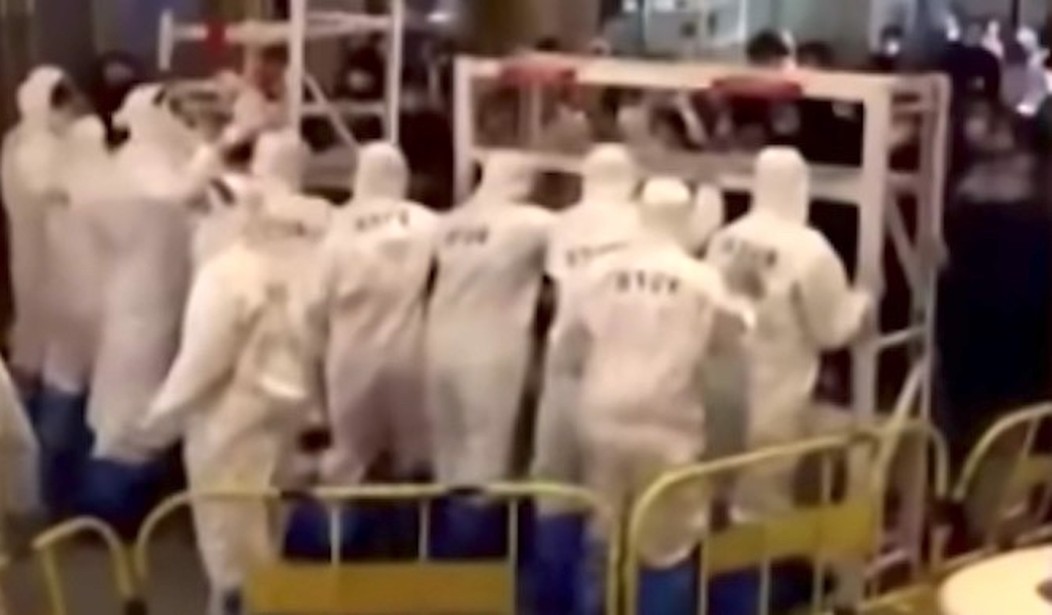Call it the Tiananmen Moment. A popular uprising against the rule of Xi Jinping and the prison state his “zero COVID” policies created has continued to expand over the last few weeks. Now Beijing has made it clear that the ruling communist clique intends to use force to put an end to it:
China threatened to “resolutely crack down” on “hostile forces” as historic protests continued overnight — including wild street battles with riot cops decked out in hazmat suits.
Communist Party leaders gave the ominous warning without directly mentioning the country-wide rallies, the largest show of dissent in the 33 years since protests in Tiananmen Square ended in horror and bloodshed.
However, in a statement Tuesday, the party’s top body in charge of law enforcement agencies stated its priority as maintaining “effective measures” to “resolutely safeguard national security.”
“We must resolutely crack down on infiltration and sabotage activities by hostile forces in accordance with the law, resolutely crack down on illegal and criminal acts that disrupt social order and effectively maintain overall social stability,” the Central Political and Legal Affairs Commission said.
The problem for Beijing is that they have already been trying to “resolutely crack down” on the protests, to no avail. Videos emerged of the protests overnight in Guangzhou and Jinan, as clashes with hazmat-clad riot police ensued in both cities. In Guangzhou, police marched in with a Roman-style testudo formation, which may have dented the protests and netted a few arrests. At least from these videos, however, it didn’t do much more than that:
In 1989, China only had to send tanks and police into Tiananmen Square to put down an uprising — a peaceful one at that. Beijing conducted that operation in a world where people didn’t routinely carry around video cameras in their pockets, and where such videos could get instant global publication on the cheap either. That allowed China’s Communist Party to use force in a localized manner to quietly — domestically, anyway — put down an embarrassing rebuke to their power and policies.
What happens in today’s world when China has to try this not just in one city, but in dozens? And what happens when these videos make clear to others in China and around the world that their tactics and strategy are failing to dissuade people from speaking out? That’s the Tiananmen Moment, and this time Xi Jinping and the CCP regime may find themselves on the wrong end of it.
Even the New York Times, which prematurely swallowed and regurgitated Xi’s COVID propaganda in February 2021, has woken up to the “nearly unimaginable” popular uprising taking place:
The dissent was nearly unimaginable until a few days ago.
Protests against Covid lockdowns have rippled across China, among the most widespread there in decades. Some Chinese people, many of them young, are fed up with the government’s lockdowns, mandatory quarantines and mass testing, all part of the zero-Covid strategy intended to limit transmission of the virus. But few demonstrators shouted their frustration — they held up white pieces of paper instead.
These blank sheets illuminate the limits of criticism in China. In democracies, booming crowds and brazen signs are hallmarks of protest. But Chinese citizens risk being prosecuted for criticizing the government. The Communist Party under Xi Jinping, China’s leader, has cracked down on dissent, making even subtle acts of opposition perilous.
“These protests are absolutely extraordinary, especially in the era of Xi Jinping, who has really tightened controls on speech,” said Vivian Wang, a Times correspondent in Beijing who is covering the demonstrations there. “The white paper is an implicit criticism of that censorship.” …
Some protests were more direct. Crowds of people in Beijing and Shanghai, mainly in their 20s and 30s, marched and chanted for an end to the country’s three years of draconian Covid restrictions and demanded more rights. “We don’t want lockdowns, we want freedom!” they shouted. “Freedom of the press! Freedom of publishing!” Some in Shanghai went so far as to even call for Xi to step down, a rare and bold challenge.
I guess giving Xi the big W in February of last year was a mistake, eh? (Worth noting, too: the NYT still hasn’t updated that story since April 1, 2021.) This dissent was only “unimaginable” to people who swallowed Beijing’s party line lock, stock, and barrel. Everyone else recognized that the continuous lockdowns and privations imposed on the Chinese people would eventually create some level of discontent and unrest, no matter how much happy gloss the Xi regime put on it for its Western useful idiots in the media.
That doesn’t mean that Beijing can’t succeed in ultimately tamping down this uprising. But that task is orders of magnitude more difficult in 2022 than it was in 1989, and this time Beijing has all but necessitated such a revolt through its comprehensive tyrannical exercises of raw power over the last three years.







Join the conversation as a VIP Member